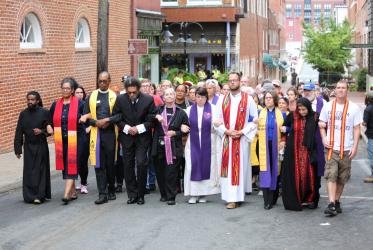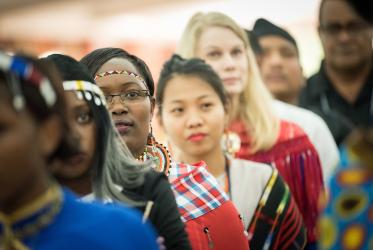#ThisIsWhatTheologyLooksLike
By Annegreth Schilling*
Ferguson is in turmoil. So is New York. And so is Union Theological Seminary in the city of New York, a long-standing institution of theological education located on the upper west side of Manhattan – or in West Harlem – since 1836.
The question whether Union Theological Seminary belongs geographically to the wealthy part of upper Manhattan, where Columbia University is situated and where big, old, European-style apartment houses shape the streets, or whether it is seen as a part of Harlem, famous for its black population, history and culture, plays a crucial role in identifying the locus of theology.
For Union students, there is no doubt that Union should stand in solidarity with Harlem. Ever since the grand jury’s decision last week not to indict a police officer for his fatal chokehold on Eric Garner in July 2014, a black man selling loose cigarettes on a street in Staten Island, New York, the seminary is in a state of disorder – and this in the midst of final exams.
Shortly after this judicial decision, students created a protest camp at the seminary as a place of sanctuary. This “Love Hub”, as it is affectionately called, is open 24 hours per day providing space for students to gather, discuss, pray, call in case of emergency, comfort each other and plan actions together.
“This hub gave us a space to talk about our differences”, says Sadie Lansdale, a Unitarian Universalist first-year student in the Master of Divinity programme (MDiv). She was arrested along with many more Union students protesting for justice on New York’s streets, bridges and highways. Candace Simpson, also from Sadie’s cohort of students at Union, adds: “This is an experiment.” But she also feels that something historic is going on, and that it is closely linked to the Civil Rights Movement in the 1950s and 60s. Yet she affirms: “The struggle continues, it never ended from what we call the Civil Rights Movement. We fight for our freedom every day.”
#BlackLivesMatter – this hashtag has become the slogan for the protests all over the United States. The present movement addresses what it alleges to be the systemic state and police violence against black men like Eric Garner, black women like Renisha McBride and black transgender individuals like Deshawnda Sanchez. According to a report from 2012, every 28 hours a black man, woman or child is killed by police or vigilante law enforcement in the United States. “This is genocide,” one student says. “This has to stop now.”
The protests at Union Theological Seminary, however, are not limited to the “Love Hub”. As one of 30 US faith leaders who recently travelled to Ferguson, Missouri, president Rev. Dr Serene Jones publicly has called for a structural and systemic change from violence against black people. For Jones, the killing of “black bodies” (marginalized human beings created in God’s image) has to be connected to the suffering of Jesus Christ and the teaching of the church, as she explained in a TV talk show last week:
“We spend so much time in our churches teaching individual people to stop doing individual bad things – it usually has to do with sex or something – and we say nothing about the systemic, collective sin of racism... We think about the central story of Christianity; it’s the story of a black body being executed by the most powerful nation in the world.”
With this theologically strong message, Jones concurs with a statement by the World Council of Churches (WCC) executive committee in late November which highlighted the “deep-rooted problems of race relations and racial profiling in the United States of America.”
“We stress that the human dignity of everyone must be respected regardless of race, ethnicity, or culture, and the critical importance of justice being seen to be done,” the minutes of the WCC executive committee underline.
As Christmas draws near, many students will leave campus and spend the holidays with their families and friends in their hometowns. Many of them understand themselves as prophetic activists, knowing that Union Theological Seminary is a unique place from which important signals can be sent throughout the country:
“We have to go back to our homes and have real conversations with our families about race, black bodies and white supremacy,” one student says. “I am privileged to be a student of this seminary and I feel the obligation to bring this back to the context from where I come.”
Talking about #BlackLivesMatter in light of the Nativity: this is what theology looks like from the perspective of Union Theological Seminary in the city of New York. And that is happening just now.
[770 words]
*Annegreth Schilling is a German theologian currently working as a post-doctoral visiting scholar at Union Theological Seminary. Her research addresses inter-church and post-ecumenical cooperation in global cities.
Read also:
WCC Executive Committee expression of concern on racial tensions in the United States
WCC member churches in the United States









